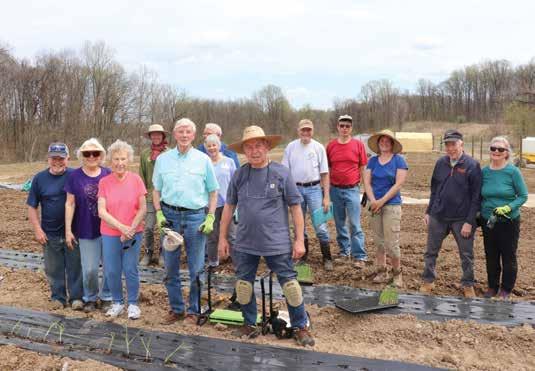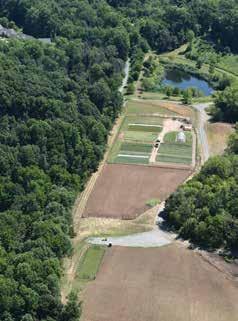
2 minute read
Rodale Trailside Organic Farm Integrates Seniors
by Sheila Julson
After World War II, the American middle class embraced new methods to make life more convenient and productive, including farming. But Pennsylvania farmer Jerome Irving Rodale had different ideas. He rejected synthetic agricultural inputs in lieu of maintaining soil health. The Rodale Institute that bears his name maintains nine campuses worldwide and has become a recognized leader in the regenerative organic agriculture movement.
Advertisement
Training the next generation of regenerative farmers is a key component of their strategy. The Rodale Institute Farmer Training program is a comprehensive platform for those seeking organic farming techniques. In-person and virtual public workshops explore topics such as organic gardening and backyard composting and consults farmers about ways to transition to or start farming regeneratively.
Rodale Institute offers public guided tours of the main campus, and their website contains downloadable resources to learn more about regenerative farming, along with a wealth of information for new and established farmers to locate private, state and federal funding sources.
New Program Serves Seniors
One of Rodale’s recent efforts is the Trailside Organic Farm, partnering with Cornwall Manor, a continuing care retirement community in Lebanon County. The unique, two-acre farm is focused on increasing seniors’ access to healthy, local food while offering a thriving natural environment that supports their well-being. Residents have become engaged in learning about regenerative agriculture. “They love what they’re doing. So many residents have signed up to help at the farm in different capacities,” says manager Ian Frederick, who was previously involved in programs at Rodale Institute before focusing entirely on this project.
Weidman had this piece of the property cleared and new topsoil brought in.
Frederick credits Vicki Deitzler, vice president for advancement at Cornwall Manor, for getting the program off the ground. With supply chain shortages that have persisted since the onset of the pandemic, an on-site farm seemed an ideal way to get fresh, local produce to residents while encouraging them to work on the farm.
The first season of the farm was trial and error to see what types of produce grew well and what was best received by the residents; now customers will define what is grown. “This year, we’re narrowing it down to recognizable vegetables such as round tomatoes, potatoes, onions, squash and cucumbers,” Frederick says. “We’re also growing more bulk for the chefs at Cornwall’s two dining halls.”
The chefs have crafted menus to work with what is available seasonally from Trailside Organic Farm. “We grew leeks, and chefs used those for a tomato leek soup. Another chef quickly figured out what to do with garlic scapes,” Frederick notes. He and assistant farm manager Katie Landis are balancing what people want with growing to the sizes and uniformity of what chefs would get from a distributor.
The weekly farm market held from May through November is open to residents and employees at the busy community center and generates lots of conversation about preparing food and how it is grown. Frederick says farm updates are covered in monthly articles in the Cornwall Manor newsletter distributed to residents and employees.
While Trailside Organic Farm is an active production farm, Frederick plans to ramp up the engagement component with more workshops, informational sessions, volunteer opportunities, tours and events. A new bank barn, due for completion in May, will also house a seminar room for workshops. In the future, a greenhouse will be built, as well as a second hoop house.
Rodale Institute is headquartered at 611 Siegfriedale Rd., in Kutztown. For more information, call 610-683-1400 or visit RodaleInstitute.org. For more information about Cornwall Manor and Trailside Organic Farm, visit CornwallManor.org/ living-at-cornwall-manor/health-wellness/ trailside-organic-farm. See ad, page 25.







